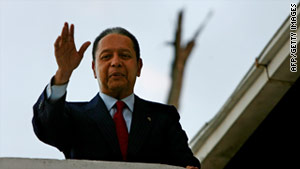Swiss law takes effect, blocks Duvalier's assets

Jean-Claude Duvalier is accused of pillaging Haiti's national treasury during his 15-year rule.
STORY HIGHLIGHTS
-
The law was enacted to ease repatriation of illicit funds
-
Former Haitian dictator Jean-Claude Duvalier has $5.7 million in a Swiss account
-
The United Nations offers to help prosecute Duvalier
-
Haiti agrees to issue a passport to former President Jean-Bertrand Aristide
RELATED TOPICS
(CNN) -- A Swiss law that took effect Tuesday blocked millions of dollars held in bank accounts belonging to former Haitian dictator Jean-Claude "Baby Doc" Duvalier, who made a stunning return to his homeland last month.
The United Nations human rights chief, meanwhile, offered to help Haitian authorities prosecute Duvalier for alleged crimes committed during his 15-year rule that ended with his ouster in 1986.
The new law, dubbed by Swiss lawmakers the "Duvalier law," eases the rules for confiscating illegal assets of political leaders and repatriating the money.
Duvalier stands accused of pillaging Haiti's national treasury during his years in power. Haitian authorities are investigating allegations of corruption and embezzlement, but the strongman has not been formally charged.
He also could face further charges of human rights abuses committed under his leadership. Human rights groups want Duvalier to face justice for the alleged torture and killings of thousands of Haitians.
"Haiti has an obligation to investigate the well-documented serious human rights violations that occurred during the rule of Mr. Duvalier, and to prosecute those responsible for them," said Navi Pillay, the U.N. high commissioner for human rights.
"Such systematic violations of rights cannot remain unaddressed. The thousands of Haitians who suffered under this regime deserve justice," she said.
The Swiss Restitution of Illicit Assets Act was enacted to help overcome existing hurdles with states that have no mutual legal assistance partnership with Switzerland or with troubled nations that are incapable of criminal proceedings at the national level, according to the Swiss Foreign Ministry.
It as been a quarter-century since Duvalier fled Haiti, but the government has not brought him to trial.
For a judge to order restitution, a government must prove a discrepancy between the wealth of a "politically exposed person" and his or her earnings, along with high levels of corruption in that country.
Enrico Monfrini, a Switzerland-based lawyer who has been representing the Haitian government in a long and drawn out legal battle over Duvalier's cash, said the law was drafted very quickly.
He said Duvalier's $5.7 million in Swiss banks is not a large amount compared with the hundreds of millions the former leader allegedly stole, but morally, repatriation of the money would be a huge victory.
"This money will go back to Haiti for sure," Monfrini said. "It will never go back to Duvalier."
Duvalier's intentions behind his return home are still unclear. A team of U.S. lawyers advising him have said Duvalier wants the Swiss money repatriated to Haiti through a transparent third party in the United States and ultimately used for earthquake recovery efforts.
On the heels of Duvalier's return, former Haitian President Jean-Bertrand Aristide said he was also ready to go back. Haitian authorities have agreed to issue him a passport to travel, according to a letter to the Haitian foreign and interior ministers sent by Ira Kurzban, Aristide's layer in the United States.
The letter urges Haiti to expedite the issuance of the passport and so that "plans for his return commence immediately." Aristide lives in exile in South Africa.
Aristide, a former Roman Catholic priest, was Haiti's first democratically president but remains a controversial figure in the Caribbean nation. However, he still commands a following in Haiti.

